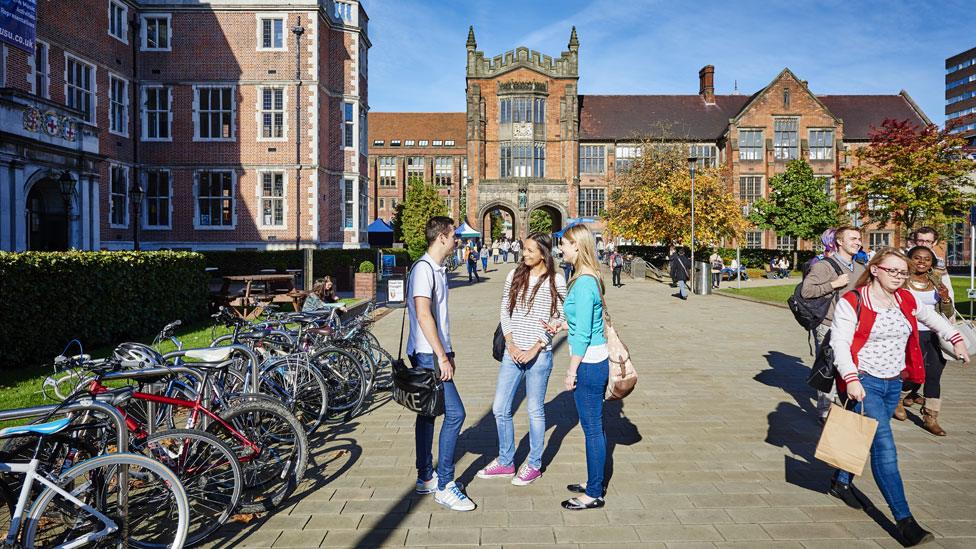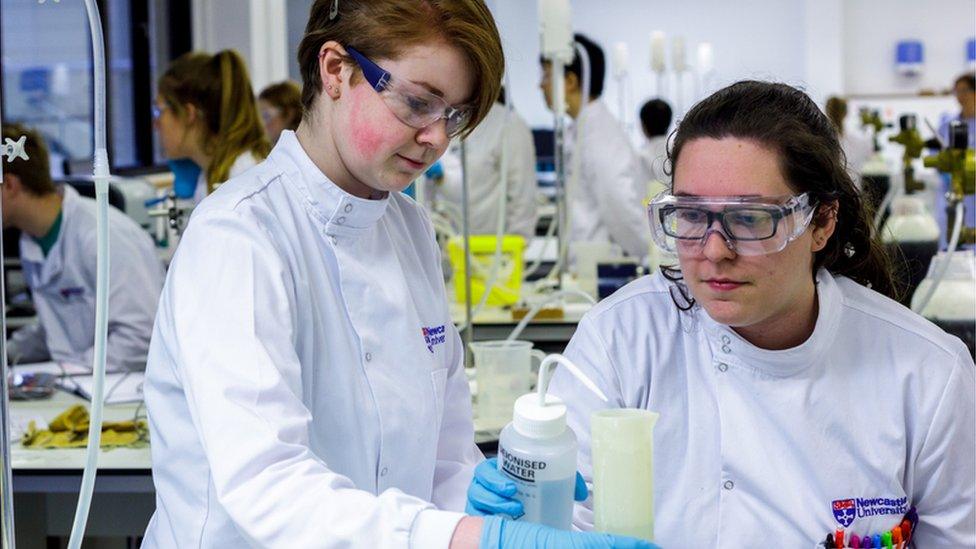A-levels U-turn: Universities facing 'crazy demand' from students
- Published

After the government made a last-minute U-turn over how A-levels were graded, thousands of students who initially thought they had missed out on their first choice of university may now have the grades to trade up. But can universities still help them or is it too late?
"The demand from students has gone crazy," says Emma Reay, director of admissions at Newcastle University.
Following the government's announcement on Monday to revert to teacher-assessed grades, she says the university has been "inundated" with queries from students, with more than 700 phone calls in the first two hours on Tuesday morning.
"It's just been a logistical nightmare the last couple of days," she says. "We want students to know what's happening, we want to be able to support them.
"If that includes them coming to Newcastle University, or includes them now no longer wanting to come here, we have to make that as easy as possible for them and that's what we're trying to do."
'Waiting game'
She says the process has been made more difficult because universities themselves have yet to be granted access to upgraded results, so the university has put its admissions process on hold until they receive them.
"It's a waiting game until we hear from Ucas - we're just making sure the systems are ready to go."
Admissions service Ucas says it hopes to pass the grades on to universities on Friday., external
The university has received more requests than normal from UK students wanting to defer to next year, she says, but they haven't seen many students withdrawing their applications so far.
Prior to the government U-turn over results, she says Newcastle University had minimal places left to fill. But it is one of a number of institutions which have said they are working to honour all their offers, although, like others, they have limited spots in medicine and dentistry.

Universities are currently restricted by a cap on the number of places they can offer to study medicine
"One way or another, we will honour an offer for them no matter what the course," she says. "It may be that some students have to consider that being next year, to cope with the demand, but we'll just have to wait and see."
She says that could mean accepting more students than they had originally planned to, although that would bring other complications like capacity issues, a need for more staff, and trying to operate within Covid-safe conditions.
However, she says the main focus for the university - a member of the Russell Group which is made up of 24 leading universities - is making the situation as "easy as possible" for students.
"Every meeting I go into, everybody is just talking about how these poor students must be feeling in all of this. It might be just another year for us, but it is the only year these students will be applying for university and it's been awful for them."
Students 'at a loose end'
Anxious students have also been keeping the phones busy at the University of Greenwich, which has seen their admissions line become more of a support service for students, according to Karen Brough, assistant director of student and academic services.
She says they have been providing pastoral care to many students who are calling to say "I haven't got a clue what my options are, I need some support".
The university has had to be very reactive to try and "unpick" the issues created by the policy changes, she says, and rather than wait for the teacher-assessed grades to be verified by Ucas, they are piecing together all the evidence supplied by students.
"What we are conscious of is the longer we wait for verifiable information, the longer we've got students that are at a loose end and don't know what's happening. And that, of course, creates a huge amount of anxiety."
She says the challenge is that offers are not straightforward decisions based on grades supplied by a computer. Instead, they have become "an individualised conversation with every applicant".
There had been suggestions that some universities would lose out on students because of their improved results, but Karen says that hasn't been the case at the University of Greenwich, adding that the "level of applicant traffic is similar to last year".
The issue of students withdrawing hasn't affected the University of Brighton either, says Carl Griffiths, head of recruitment at the university, who says there has been less movement than previous years.
He speculates that may be because students who applied in the main cycle will have already secured accommodation, "so moving universities now may be more disruptive during what is already a very challenging time".
The university has already started making verbal offers to students whose grades have gone up by relying on "formal communications from their schools", rather than wait for Ucas to confirm them, he says.
"We hope that this means that they will now be able to relax", he adds.
For universities which are already over-subscribed, offered a deferred place for 2021 is an option, although Prof Mark Goodwin, deputy vice chancellor at Exeter University, told Radio 4's today programme that would result in "knock-on implications" for students currently in Year 12.
However, he adds that his university was expecting fewer students to defer this year because of the coronavirus pandemic limiting options like gap years, so "overall there may not be that many more students deferring".
He adds that there should be some flexibility in the system "because this year and next year are years when there are fairly low numbers of 18-year-olds" compared to four or five years ago., external